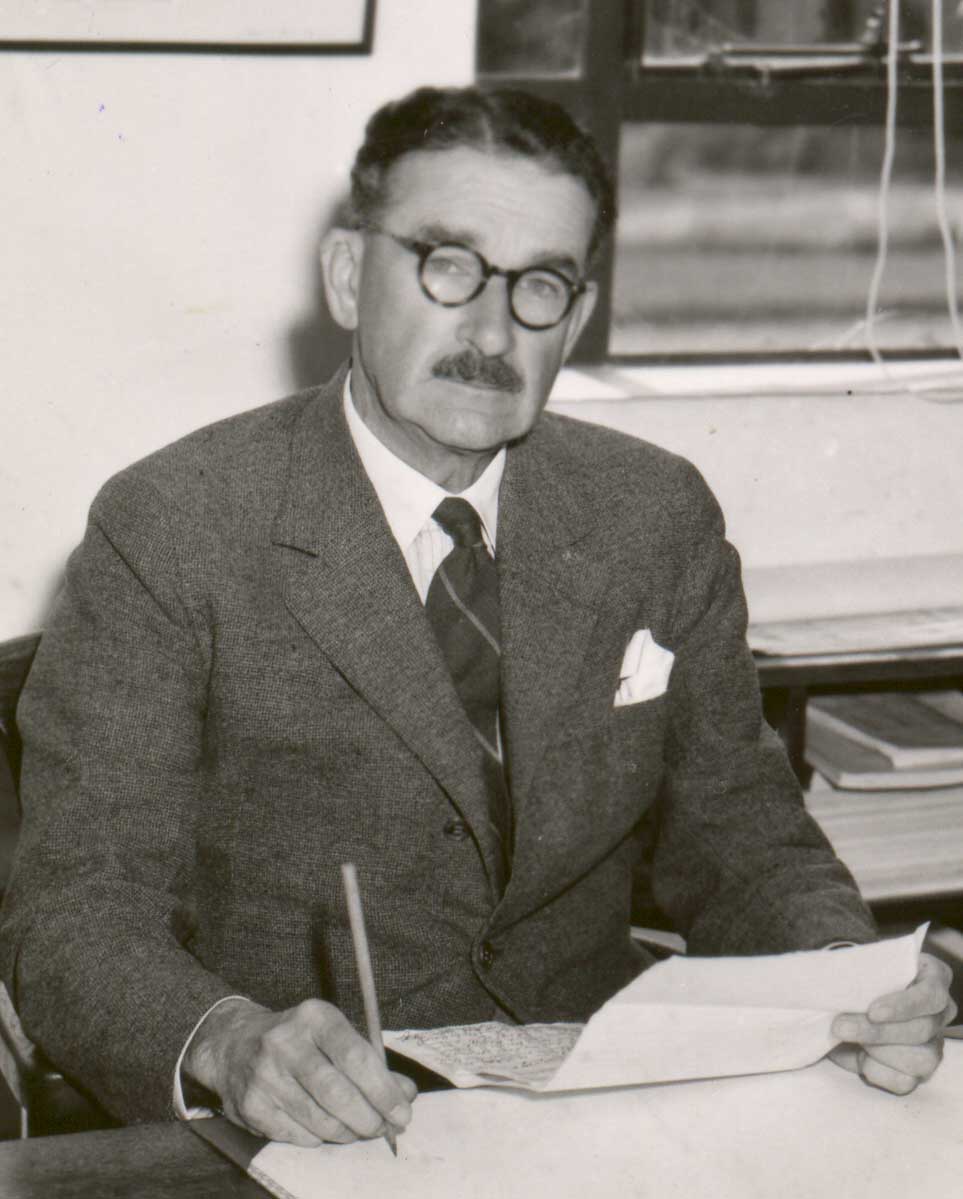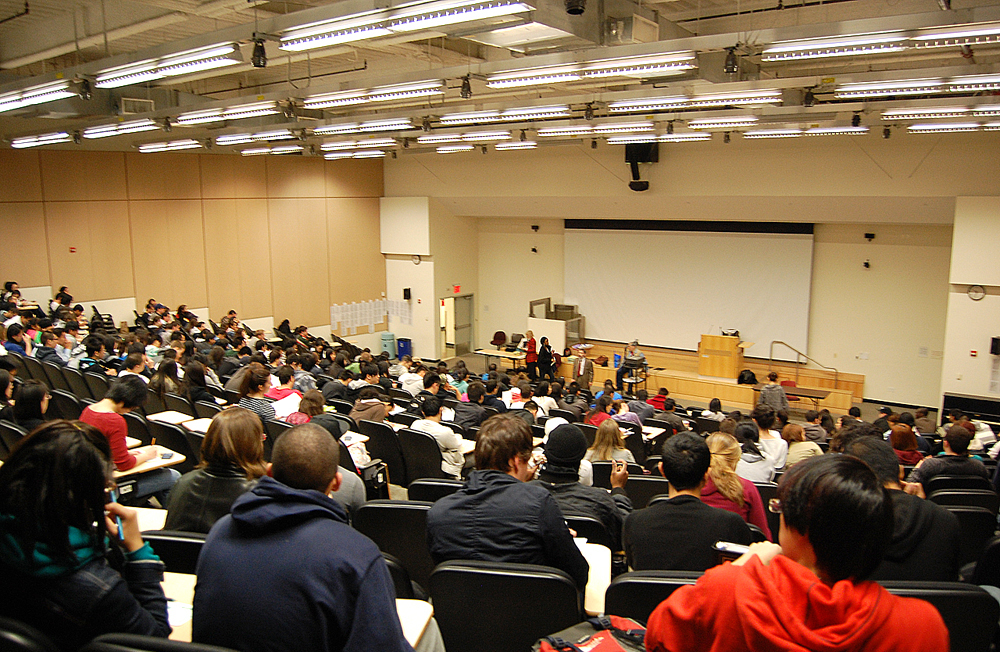|
Sir Geoffrey Peren Building
Massey University's Sir Geoffrey Peren Building, or Old Main Building as it was previously known, is located on the Manawatū campus of the university. At the time of its completion the building was known as the Agricultural Science Building, often shortened to Science Building. It was also referred to as the Main Building, and later as the Old Main Building. In 2010, it was renamed in honor of Sir Geoffrey Peren, the first principal of the university's forerunner, Massey Agricultural College. History Constructed from 1929 to 1931, the building was designed to serve as the administration and teaching building of Massey Agricultural College by American architect Roy Alstan Lippincott, who had settled in Auckland. Lippincott was the brother-in-law of Walter Burley Griffin and had earlier been involved, along with Griffin, with the planning of Canberra. On 4 December 1929 the foundation stone of the Science Building was laid by the Governor-General Sir Charles Fergusson. The ... [...More Info...] [...Related Items...] OR: [Wikipedia] [Google] [Baidu] |
Sir Geoffrey Peren
Brigadier Sir Geoffrey Sylvester Peren (30 November 1892 – 19 July 1980) was an agricultural scientist, university professor, and agricultural college principal, as well as a soldier in the two world wars, serving in the Canadian, British, and New Zealand armies. Biography Peren was born in Streatham, Surrey, England, on 30 November 1892. While still a teenager, he emigrated to Canada, working on farms and orchards in Ontario and British Columbia. He was subsequently awarded a scholarship to attend the Ontario Agricultural College. After completing his studies, Peren worked in an orchard for a short time and then enlisted in the Canadian Expeditionary Force in March 1915. He was a sergeant in the ammunition column of the 4th Field Artillery Brigade, which was part of the 2nd Canadian Division. After arriving in England in May 1915, he applied for a transfer to the British Army, and was commissioned in the Royal Field Artillery. From late 1915, he served on the Western Front as ... [...More Info...] [...Related Items...] OR: [Wikipedia] [Google] [Baidu] |
Marseilles Tile
Roof tiles are designed mainly to keep out rain, and are traditionally made from locally available materials such as terracotta or slate. Modern materials such as concrete, metal and plastic are also used and some clay tiles have a waterproof glaze. Roof tiles are 'hung' from the framework of a roof by fixing them with nails. The tiles are usually hung in parallel rows, with each row overlapping the row below it to exclude rainwater and to cover the nails that hold the row below. There are also roof tiles for special positions, particularly where the planes of the several pitches meet. They include ridge, hip and valley tiles. These can either be bedded and pointed in cement mortar or mechanically fixed. Similarly to roof tiling, tiling has been used to provide a protective weather envelope to the sides of timber frame buildings. These are hung on laths nailed to wall timbers, with tiles specially molded to cover corners and jambs. Often these tiles are shaped at the exposed ... [...More Info...] [...Related Items...] OR: [Wikipedia] [Google] [Baidu] |
Renovated
Renovation (also called remodeling) is the process of improving broken, damaged, or outdated structures. Renovations are typically done on either commercial or residential buildings. Additionally, renovation can refer to making something new, or bringing something back to life and can apply in social contexts. For example, a community can be renovated if it is strengthened and revived. It can also be restoring something to a former better state (as by cleaning, repairing, or rebuilding). Phases and process of renovations The building renovation process can usually, depending on the extents of the renovation, be broken down into several phases. The phases are as follow. *Project initiation - The beginning of the project that includes the hiring of construction and design team, defining the scope of work, creating a budget, and communicating the needs, expectations, and wants from both the client and building teamKonstantinou, Thaleia, et al. “Renovation Process Challenges a ... [...More Info...] [...Related Items...] OR: [Wikipedia] [Google] [Baidu] |
Side Wings
Side or Sides may refer to: Geometry * Edge (geometry) of a polygon (two-dimensional shape) * Face (geometry) of a polyhedron (three-dimensional shape) Places * Side (Ainis), a town of Ainis, ancient Thessaly, Greece * Side (Caria), a town of ancient Caria, Anatolia * Side (Laconia), a town of ancient Laconia, Greece * Side (Pontus), a town of ancient Pontus, Anatolia * Side, Turkey, a city in Turkey * Side, Iran, a village in Iran * Side, Gloucestershire, or Syde, a village in England Music * Side (recording), the A-side or B-side of a record * The Side, a Scottish rock band * ''Sides'' (album), a 1979 album by Anthony Phillips * ''Sides'', a 2020 album by Emily King * "Side" (song), a 2001 song by Travis * "Sides", a song by Flobots from the album ''The Circle in the Square'', 2012 * "Sides", a song by Allday from the album ''Speeding'', 2017 Teams * Side (cue sports technique) * Side, a team, in particular: ** Sports team Other uses * Side (mythology), one of three mytholo ... [...More Info...] [...Related Items...] OR: [Wikipedia] [Google] [Baidu] |
Study (room)
A study, also known as a home office, is a room in a house that is used for paperwork, computer work, or reading. Historically, the study of a house was reserved for use as the private office and reading room of a parent/guardian as the formal head of a household, but today studies are generally either used to operate a home business or else open to the whole family. History The study developed from the closet or cabinet of the Renaissance era. From the beginning of the 18th century onwards increased literacy at the middle-class family level led to the setting aside of closed study and library areas within larger houses. Here commercial work, reading, correspondence, fact-recording and other activities could be undertaken in privacy and silence. Until well into the 20th century gender restrictions on social roles made the domestic study an essentially male facility. The 19th century clergyman would prepare sermons and interview parishioners in his study while his equally literate ... [...More Info...] [...Related Items...] OR: [Wikipedia] [Google] [Baidu] |
Seminar Room
A seminar is a form of academic instruction, either at an academic institution or offered by a commercial or professional organization. It has the function of bringing together small groups for recurring meetings, focusing each time on some particular subject, in which everyone present is requested to participate. This is often accomplished through an ongoing Socratic dialogue with a seminar leader or instructor, or through a more formal presentation of research. It is essentially a place where assigned readings are discussed, questions can be raised and debates can be conducted. Etymology The word ''seminar'' was borrowed from German (always capitalized, as a common noun, as ''Seminar''), and is ultimately derived from the Latin word ''seminarium'', meaning "seed plot" (an old-fashioned term for “seedbed”). Its root word is ''semen'' (Latin for "seed"). Overview The term ''seminar'' is also used to describe a research talk, often given by a visiting researcher and primarily ... [...More Info...] [...Related Items...] OR: [Wikipedia] [Google] [Baidu] |
Lecture Theater
A lecture hall (or lecture theatre) is a large room used for instruction, typically at a college or university. Unlike a traditional classroom with a capacity normally between one and fifty, the capacity of lecture halls is usually measured in the hundreds. Lecture halls almost always have a pitched floor, so that those in the rear are sat higher than those at the front (i.e. tiered seating), allowing them to see the lecturer. The importance of lecture halls is so significant that some schools of architecture have offered courses exclusively centered on their design. The noted Boston architect Earl Flansburgh wrote numerous articles focusing on achieving efficacious lecture hall design. Lecture halls differ from other types of learning spaces, seminar rooms in particular, in that they allow for little versatility in use, although they are no less flexible than, for example, chemistry laboratories. Experimentation, group work, and other contemporary educational methods are no ... [...More Info...] [...Related Items...] OR: [Wikipedia] [Google] [Baidu] |
Level
Level or levels may refer to: Engineering *Level (instrument), a device used to measure true horizontal or relative heights *Spirit level, an instrument designed to indicate whether a surface is horizontal or vertical *Canal pound or level *Regrading or levelling, the process of raising and/or lowering the levels of land * Storey or level, a vertical unit of a building or a mine *Level (coordinate), vertical position Gaming *Level (video games), a stage of the game *Level (role-playing games), a measurement of character development Music *Level (music), similar to but more general and basic than a chord * ''Levels'' (album), an album by AKA * "Levels" (Avicii song) * "Levels" (Bilal song) * "Levels" (Nick Jonas song) * "Levels" (Meek Mill song) * "Level" (The Raconteurs song) * "Levels" (NorthSideBenji song), featuring Houdini Places *Level Mountain, a volcano in northern British Columbia, Canada *Levél, Győr-Moson-Sopron, Hungary *Levels, New Zealand *Level, Ohio, United Sta ... [...More Info...] [...Related Items...] OR: [Wikipedia] [Google] [Baidu] |
Auditorium
An auditorium is a room built to enable an audience to hear and watch performances. For movie theatres, the number of auditoria (or auditoriums) is expressed as the number of screens. Auditoria can be found in entertainment venues, community halls, and theaters, and may be used for rehearsal, presentation, performing arts productions, or as a learning space. Etymology The term is taken from Latin (from ''audītōrium'', from ''audītōrius'' ("pertaining to hearing")); the concept is taken from the Greek auditorium, which had a series of semi-circular seating shelves in the theatre, divided by broad 'belts', called ''diazomata'', with eleven rows of seats between each. Auditorium structure The audience in a modern theatre are usually separated from the performers by the proscenium arch, although other types of stage are common. The price charged for seats in each part of the auditorium (known in the industry as the house) usually varies according to the quality o ... [...More Info...] [...Related Items...] OR: [Wikipedia] [Google] [Baidu] |
Laboratories
A laboratory (; ; colloquially lab) is a facility that provides controlled conditions in which scientific or technological research, experiments, and measurement may be performed. Laboratory services are provided in a variety of settings: physicians' offices, clinics, hospitals, and regional and national referral centers. Overview The organisation and contents of laboratories are determined by the differing requirements of the specialists working within. A physics laboratory might contain a particle accelerator or vacuum chamber, while a metallurgy laboratory could have apparatus for casting or refining metals or for testing their strength. A chemist or biologist might use a wet laboratory, while a psychologist's laboratory might be a room with one-way mirrors and hidden cameras in which to observe behavior. In some laboratories, such as those commonly used by computer scientists, computers (sometimes supercomputers) are used for either simulations or the analysis of data. Scienti ... [...More Info...] [...Related Items...] OR: [Wikipedia] [Google] [Baidu] |
Library
A library is a collection of materials, books or media that are accessible for use and not just for display purposes. A library provides physical (hard copies) or digital access (soft copies) materials, and may be a physical location or a virtual space, or both. A library's collection can include printed materials and other physical resources in many formats such as DVD, CD and cassette as well as access to information, music or other content held on bibliographic databases. A library, which may vary widely in size, may be organized for use and maintained by a public body such as a government; an institution such as a school or museum; a corporation; or a private individual. In addition to providing materials, libraries also provide the services of librarians who are trained and experts at finding, selecting, circulating and organizing information and at interpreting information needs, navigating and analyzing very large amounts of information with a variety of resources. Li ... [...More Info...] [...Related Items...] OR: [Wikipedia] [Google] [Baidu] |
Lecture Room
''Lecture Room'' is a Chinese television programme hosted by China Central Television (CCTV), in which scholars from various disciplines are invited to provide lectures. It was first broadcast on 9 July 2001 on CCTV-10. In its early days, featured topics included biology, physics, economics, history and literature, and the lecturers were from around the world. Its focus has gradually changed, as recent programmes focus more on Chinese history and Chinese culture. The show's title is literally translated as ''The Hundred Schools of Thought Forum''. ''Lecture Room'' is only an English adaptation of its Chinese title. Lecture series *Yi Zhongtian, ''Influential Personalities of the Han Dynasty''; ''Analysis of the Three Kingdoms'' (品三国) *Liu Xinwu, ''Liu Xinwu Exposes the Secrets of Dream of Red Chamber'' I-IV (刘心武揭密红楼梦 1-4) *Yan Chongnian, ''Emperors of the Qing Dynasty'', ''The Fall of Ming and Rise of Qing'' *Mao Peiqi, ''Emperors of the Ming Dynasty'' *Wang ... [...More Info...] [...Related Items...] OR: [Wikipedia] [Google] [Baidu] |






